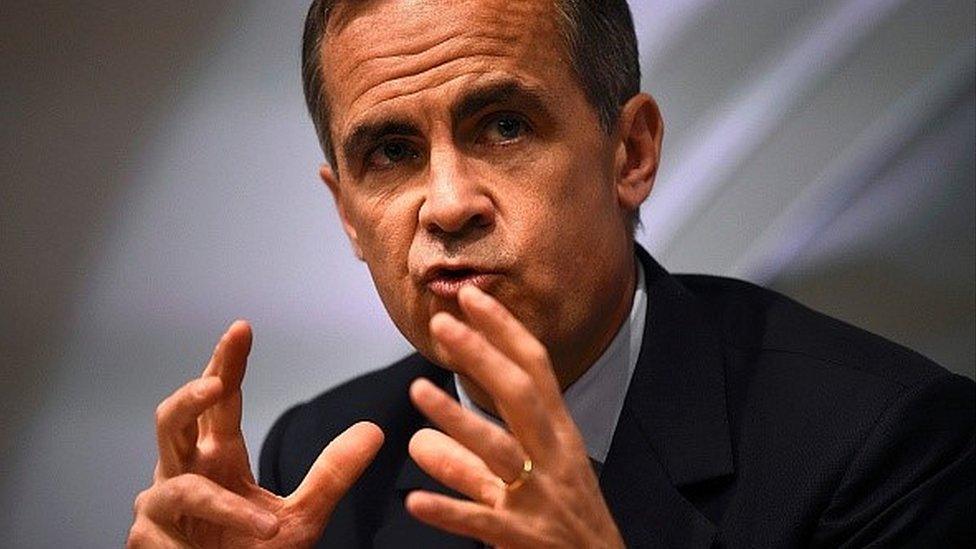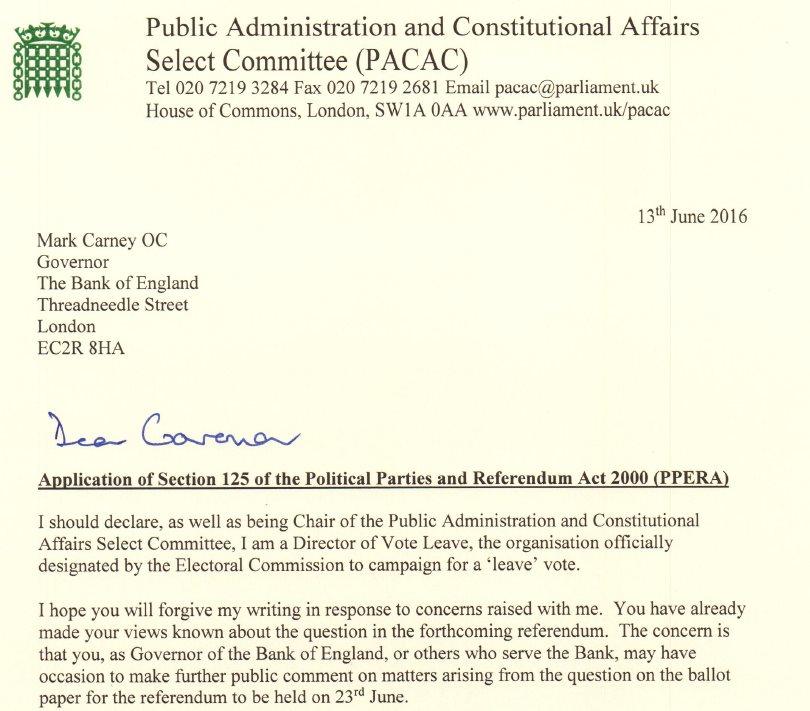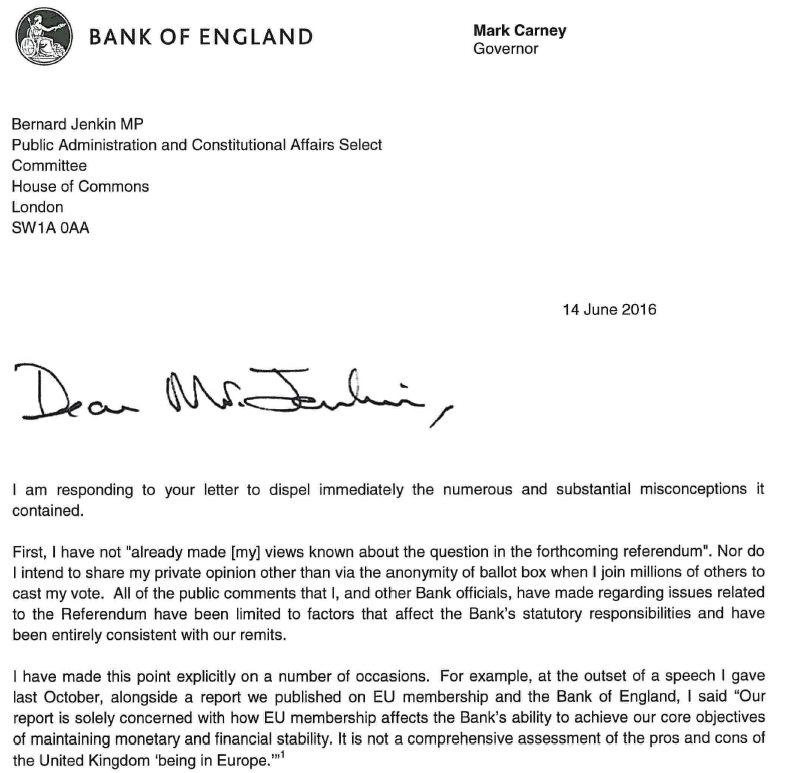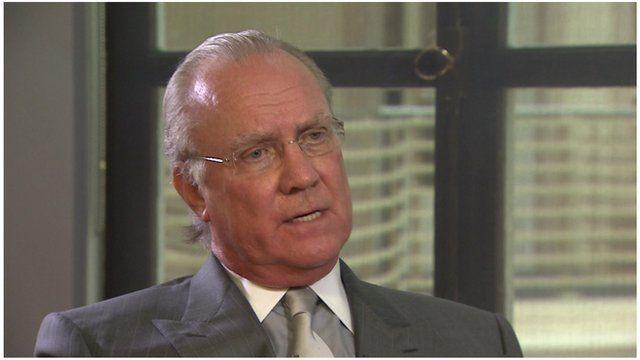Bank governor Mark Carney clashes with Vote Leave over EU
- Published

Bank of England governor Mark Carney has hit back at critics in the Vote Leave campaign who have warned him about commenting on the Referendum.
In a three-page letter to Vote Leave's Bernard Jenkin MP, Mr Carney criticised "numerous and substantial" mistakes.
Mr Jenkin had complained that Mr Carney was wrong to say recently that leaving the EU would cause an economic shock.
BBC economics editor Kamal Ahmed said Bank officials felt Mr Jenkin's comments were an implied "threat".
Last month, the Governor said the shock of leaving the EU could cause a "technical recession" - six months of negative economic growth.
That prompted Mr Jenkin, a director of Vote Leave and chairman of the Public Administration Committee, to write to Mr Carney about rules banning "any public comment" in the run up to the 23 June referendum.
Mr Jenkin continued his criticism of Mr Carney on Thursday, when he told the BBC's Today programme that the governor had been wrong to appear on the Andrew Marr show days after the "technical recession" comments.
According to the BBC's Kamal Ahmed, who has seen both letters, senior Bank officials considered this a "threat" which contained "numerous and substantial" misconceptions. It was, he said, something that Mr Carney felt needed a robust response.
Mr Carney's letter said that there was a "fundamental misunderstanding" about the independence of the Bank.




'Prohibited'
Later on Thursday, the Monetary Policy Committee of the Bank, chaired by Mr Carney, will publish its latest interest rate decision and the minutes of its meeting.
Those minutes are expected to contain a reference to the Referendum and the latest views of the committee on any economic effects the Bank believes are connected to the vote.
However, Mr Jenkin's letter, written on 13 June, said: "You have already made your views known about the question of the forthcoming referendum.
"The concern is that you, as Governor of the Bank of England, or others who serve the Bank, may have occasion to make further public comment on matters arising from the question on the ballot paper for the referendum.
"You are prohibited from making any public comment, or doing anything which could be construed as taking part in the referendum debate," the letter continues.
"I have taken legal advice from Speakers' Counsel. . . [and] wanted to take the opportunity to stress the importance of this matter. I very much hope you will avoid doing anything which could suggest you or the Bank have disregarded Parliament's wishes."
'Fundamental misunderstanding'
Mr Carney wrote back to Mr Jenkin, saying that he had not "made my views known" on the referendum.
"Nor do I intend to share my private opinion other than via the anonymity of [the] ballot box when I join millions of others to cast my vote," the letter says.
"All of the public comments that I, or other Bank officials, have made regarding issues related to the referendum have been limited to factors that affect the Bank's statutory responsibilities and have been entirely consistent with our remits."
Mr Carney said that Mr Jenkin's letter "demonstrates a fundamental misunderstanding of central bank independence" and that the Bank has "a duty" to report its "evidence-based judgements" to Parliament and the public.
'Muzzle'
He also said that the Bank was not officially covered by the purdah rules but has "voluntarily" agreed to be bound by them "in the spirit of the guidelines issued by the Cabinet Office".
However, speaking on the Today programme on Thursday, Mr Jenkin continued his criticism of the Bank's stance, claiming that Mr Carney's response appeared "aggressive". Mr Jenkin also criticised Mr Carney's decision to appear on the BBC's Andrew Marr show last month just days after his "technical recession" comments.
Mr Jenkin told Today: "It's for [Mr Carney] to judge how political he wants his institution to be perceived as. There is no doubt for example the appearance he made on the Andrew Marr programme was way beyond what a Bank Governor would normally do in terms of making statements about rate-setting and economic forecasts and that sort of thing."
Former Labour Chancellor Alistair Darling, a leading Remain campaigner, jumped to Mr Carney's defence. He said that Mr Jenkin had made "a blatant attempt to muzzle a respected independent voice.
"The Bank of England is independent, the Governor is independent and he has a duty to say what he thinks.
"It is very clear the Leave campaign doesn't want people to hear what the Bank has to say on the most critical issue facing our generation because they don't like its conclusions."
- Published16 June 2016
- Published16 June 2016

- Published15 June 2016
